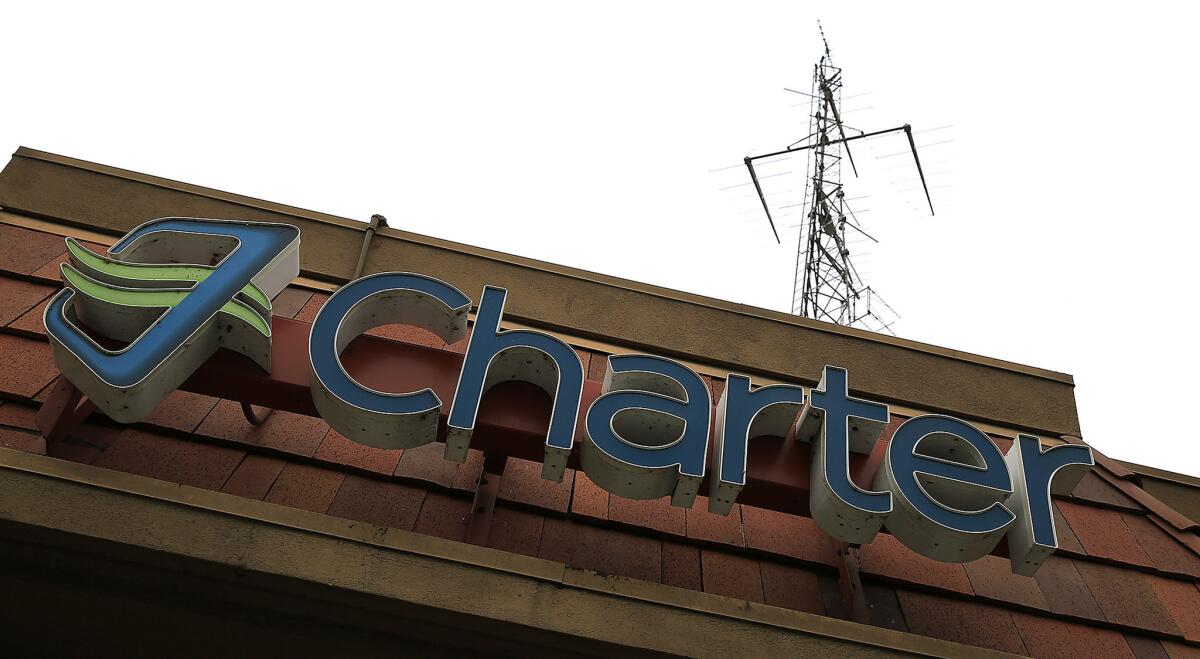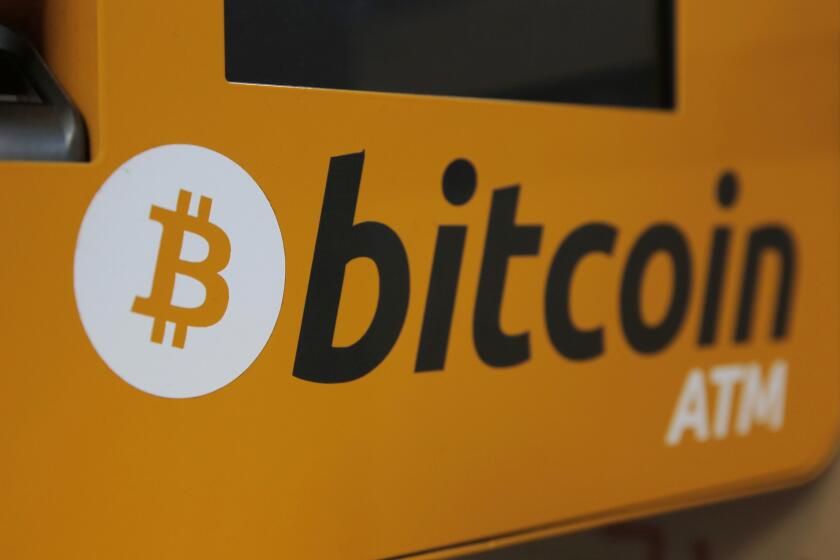Charter/Time Warner Cable deal likely to face less static from regulators

A Charter Communications office in Glendale on May 26.
Reporting from Washington — The last time Time Warner Cable was part of a proposed major corporate merger, objections by federal regulators helped scuttle the proposed acquisition of the company by Comcast Corp.
Now, Charter Communications is the suitor, and experts said its $56.7-billion deal for Time Warner Cable, announced Tuesday, stands a better chance of getting regulatory approval for a simple reason: The marriage is smaller.
The new company, which also would include smaller cable provider Bright House Networks, would have about 17.3 million pay-TV customers, compared with the 29 million customers of a combined Comcast/Time Warner Cable.
The new Charter would be the largest pay-TV provider in five of the top 20 markets nationwide, including Los Angeles. Comcast/Time Warner Cable would have been the largest provider in 17 of the top 20 markets, including not only L.A. but New York.
And after the acquisitions, Charter would have less than 30% of the high-speed broadband market under the latest definition from the Federal Communications Commission. A Comcast/Time Warner Cable combination would have had controlled 57% of that market.
“I think the outlook is quite solid for approval of this deal,” said Jeff Wlodarczak, an analyst at Pivotal Research Group.
------------
For the record
2:47 p.m., May 26: A previous version of this article misspelled analyst Jeff Wloadarczak’s last name as Wlodarcza.
------------
He noted that Charter will not own any programming, unlike Comcast, which owns NBCUniversal, and that even after swallowing Time Warner Cable and Bright House, the new company will be smaller than Comcast.
Gene Kimmelman, a former Justice Department antitrust official who now is president of the public interest group Public Knowledge, agreed that Charter’s acquisition of Time Warner Cable is much less likely to be blocked by regulators than was Comcast’s attempted purchase.
But, he added, that doesn’t mean the deal is a slam dunk for approval.
“It’s not at all clear that this is in the public interest. There are many significant questions that need to be answered and the burden is on the parties to show that, but it’s clearly less competitively dangerous than the Comcast/Time Warner Cable deal,” Kimmelman said.
“It is still enormous consolidation within cable and broadband,” he said.
Free Press, another public interest group, said it would carefully examine the Time Warner Cable and Bright House deals.
“These potential mergers won’t make Charter as massive as merged Comcast-Time Warner Cable would have been, but they raise similar public interest concerns, and the FCC should apply the lessons learned in its prior review here,” said S. Derek Turner, the group’s research director.
Executives from Charter and Time Warner Cable said they were confident the deal would receive regulatory approval and that they hoped it will close by the end of the year.
“We’re a very different company than Comcast, and this is a very different transaction,” Charter Chief Executive Thomas M. Rutledge, told analysts during a conference call Tuesday.
He said the deal would provide more consumers with faster Internet service, noting that Charter’s slowest download speed is “considerably faster and less expensive” than comparable Time Warner Cable service.
Charter will bring that upgraded service to Time Warner Cable and Bright House customers, Rutledge said.
Despite the optimism of the companies’ executives, the deal includes a $2-billion break-up fee that Time Warner Cable would receive if the transaction is not completed. There was no such fee in Comcast’s proposed purchase of Time Warner Cable.
The deal must gain the approval of the Justice Department and the FCC.
FCC Chairman Tom Wheeler said Tuesday that his agency must review every telecommunications merger to determine “whether it would be in the public interest.”
“In applying the public interest test, an absence of harm is not sufficient,” he said. “The commission will look to see how American consumers would benefit if the deal were to be approved.”
A Justice Department spokesman did not immediately respond to a request for comment on the matter.
Wheeler said in a May 6 speech to cable TV executives that the impact of the Comcast/Time Warner Cable deal on high-speed Internet market was “at the center of our analysis” of that merger. Video was a secondary concern, he said, because it is “in essence, an application that flows over networks.”
At a May 13 investor conference, Time Warner Cable Chief Executive Robert D. Marcus said he didn’t “understand the rationale” for regulators’ objections to the Comcast merger -- scuttled after federal officials indicated in late April that they would seek to block the $45-billion deal -- and that he didn’t know if a future acquisition by another company would receive approval.
After those comments, Wheeler called Marcus, Rutledge and other cable executives to tell them that just because the agency had problems with the Comcast/Time Warner Cable deal didn’t mean it wouldn’t approve others, according to two people with knowledge of the calls who were not authorized to speak publicly about them.
Wheeler did not talk about any specific future deals, the people said.
Follow @JimPuzzanghera on Twitter
More to Read
Inside the business of entertainment
The Wide Shot brings you news, analysis and insights on everything from streaming wars to production — and what it all means for the future.
You may occasionally receive promotional content from the Los Angeles Times.











